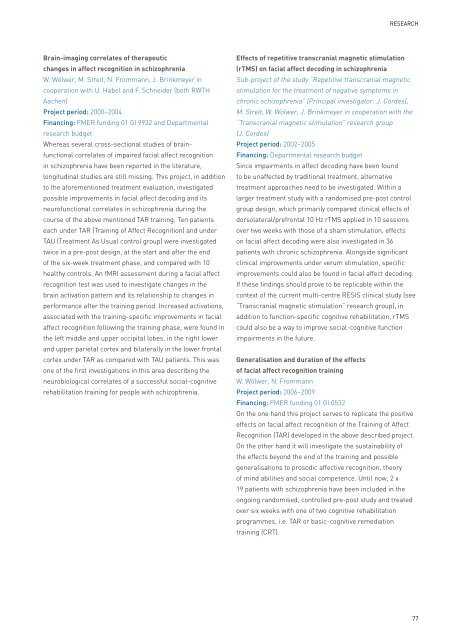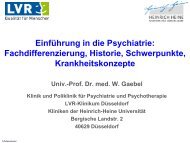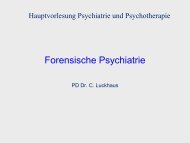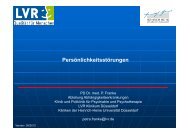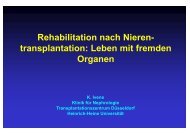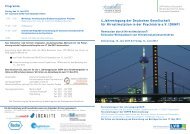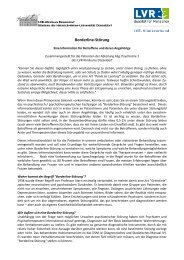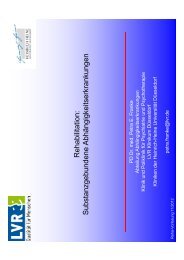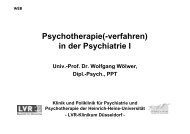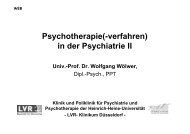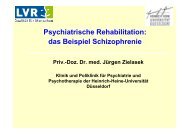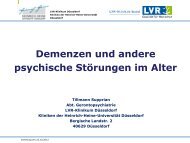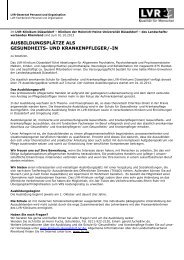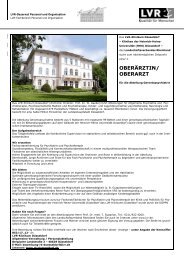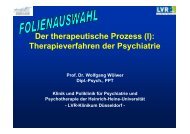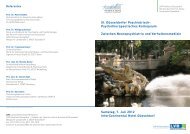LVR-Klinikum Düsseldorf Hospital of the Heinrich-Heine University ...
LVR-Klinikum Düsseldorf Hospital of the Heinrich-Heine University ...
LVR-Klinikum Düsseldorf Hospital of the Heinrich-Heine University ...
You also want an ePaper? Increase the reach of your titles
YUMPU automatically turns print PDFs into web optimized ePapers that Google loves.
Brain-imaging correlates <strong>of</strong> <strong>the</strong>rapeutic<br />
changes in affect recognition in schizophrenia<br />
W. Wölwer, M. Streit, N. Frommann, J. Brinkmeyer in<br />
cooperation with U. Habel and F. Schneider (both RWTH<br />
Aachen)<br />
Project period: 2000–2004<br />
Financing: FMER funding 01 GI 9932 and Departmental<br />
research budget<br />
Whereas several cross-sectional studies <strong>of</strong> brainfunctional<br />
correlates <strong>of</strong> impaired facial affect recognition<br />
in schizophrenia have been reported in <strong>the</strong> literature,<br />
longitudinal studies are still missing. This project, in addition<br />
to <strong>the</strong> aforementioned treatment evaluation, investigated<br />
possible improvements in facial affect decoding and its<br />
neur<strong>of</strong>unctional correlates in schizophrenia during <strong>the</strong><br />
course <strong>of</strong> <strong>the</strong> above mentioned TAR training. Ten patients<br />
each under TAR (Training <strong>of</strong> Affect Recognition) and under<br />
TAU (Treatment As Usual control group) were investigated<br />
twice in a pre-post design, at <strong>the</strong> start and after <strong>the</strong> end<br />
<strong>of</strong> <strong>the</strong> six-week treatment phase, and compared with 10<br />
healthy controls. An fMRI assessment during a facial affect<br />
recognition test was used to investigate changes in <strong>the</strong><br />
brain activation pattern and its relationship to changes in<br />
performance after <strong>the</strong> training period. Increased activations,<br />
associated with <strong>the</strong> training-specific improvements in facial<br />
affect recognition following <strong>the</strong> training phase, were found in<br />
<strong>the</strong> left middle and upper occipital lobes, in <strong>the</strong> right lower<br />
and upper parietal cortex and bilaterally in <strong>the</strong> lower frontal<br />
cortex under TAR as compared with TAU patients. This was<br />
one <strong>of</strong> <strong>the</strong> first investigations in this area describing <strong>the</strong><br />
neurobiological correlates <strong>of</strong> a successful social-cognitive<br />
rehabilitation training for people with schizophrenia.<br />
ReseaRch<br />
Effects <strong>of</strong> repetitive transcranial magnetic stimulation<br />
(rTMS) on facial affect decoding in schizophrenia<br />
Sub-project <strong>of</strong> <strong>the</strong> study “Repetitive transcranial magnetic<br />
stimulation for <strong>the</strong> treatment <strong>of</strong> negative symptoms in<br />
chronic schizophrenia” (Principal investigator: J. Cordes),<br />
M. Streit, W. Wölwer, J. Brinkmeyer in cooperation with <strong>the</strong><br />
“Transcranial magnetic stimulation” research group<br />
(J. Cordes)<br />
Project period: 2002–2005<br />
Financing: Departmental research budget<br />
Since impairments in affect decoding have been found<br />
to be unaffected by traditional treatment, alternative<br />
treatment approaches need to be investigated. Within a<br />
larger treatment study with a randomised pre-post control<br />
group design, which primarily compared clinical effects <strong>of</strong><br />
dorsolateral/prefrontal 10 Hz rTMS applied in 10 sessions<br />
over two weeks with those <strong>of</strong> a sham stimulation, effects<br />
on facial affect decoding were also investigated in 36<br />
patients with chronic schizophrenia. Alongside significant<br />
clinical improvements under verum stimulation, specific<br />
improvements could also be found in facial affect decoding.<br />
If <strong>the</strong>se findings should prove to be replicable within <strong>the</strong><br />
context <strong>of</strong> <strong>the</strong> current multi-centre RESIS clinical study (see<br />
“Transcranial magnetic stimulation” research group), in<br />
addition to function-specific cognitive rehabilitation, rTMS<br />
could also be a way to improve social-cognitive function<br />
impairments in <strong>the</strong> future.<br />
Generalisation and duration <strong>of</strong> <strong>the</strong> effects<br />
<strong>of</strong> facial affect recognition training<br />
W. Wölwer, N. Frommann<br />
Project period: 2006–2009<br />
Financing: FMER funding 01 GI 0532<br />
On <strong>the</strong> one hand this project serves to replicate <strong>the</strong> positive<br />
effects on facial affect recognition <strong>of</strong> <strong>the</strong> Training <strong>of</strong> Affect<br />
Recognition (TAR) developed in <strong>the</strong> above described project.<br />
On <strong>the</strong> o<strong>the</strong>r hand it will investigate <strong>the</strong> sustainability <strong>of</strong><br />
<strong>the</strong> effects beyond <strong>the</strong> end <strong>of</strong> <strong>the</strong> training and possible<br />
generalisations to prosodic affective recognition, <strong>the</strong>ory<br />
<strong>of</strong> mind abilities and social competence. Until now, 2 x<br />
19 patients with schizophrenia have been included in <strong>the</strong><br />
ongoing randomised, controlled pre-post study and treated<br />
over six weeks with one <strong>of</strong> two cognitive rehabilitation<br />
programmes, i.e. TAR or basic-cognitive remediation<br />
training (CRT).<br />
77


